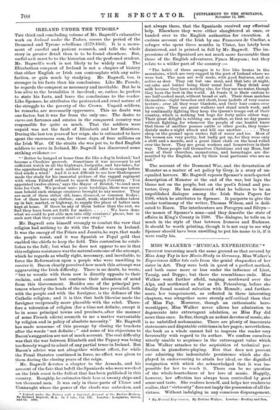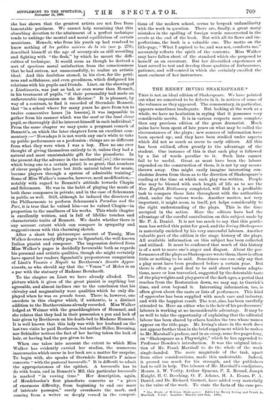MISS WALKER'S "MUSICAL EXPERIENCES."* THOUGH traversing much the same ground
as that covered by Miss Amy Fay in her Music-Study in Germany, Miss Walker's Experiences differ tote ado from the genial rhapsodies of her sister in Art. They were both in quest of a perfect method, and both came more or less under the influence of Liszt, Tausig, and Deppe ; but there the resemblance ends. Miss Walker went further afield, ranging southward over the Alps, and northward as far as St. Petersburg, before she finally found musical salvation with Henselt ; and further- more, her temperament, as reflected in these interesting chapters, was altogether more sternly self-critical than that of Miss Fay. Moreover, though an enthusiastic hero- worshipper, Miss Walker never allows her admiration to degenerate into extravagant adulation, as Miss Fay did more than once. In fine, though an ardent devotee of music, she is no unbridled melomaniac. There are plenty of inaccurate statements and disputable criticisms in her pages ; nevertheless, the book as a whole cannot fail to impress the reader very favourably with regard to its author. We confess ourselves utterly unable to acquiesce in the extravagant value which Miss Walker attaches to the acquisition of technical per- fection in pianoforte-playing. But that does not prevent our admiring the indomitable persistence which she dis- played in endeavouring to attain her ideal, or the dignified resignation with which she acknowledged that it was im- possible for her to reach it. There can be no question of the whole-heartedness of her love of music. Happily, however, her affection has always been controlled by good sense and taste. She realises herself, and helps her readers to realise, that "virtuosity" does not imply the possession of all the virtues. Without indulging in any conscious disparagement, • My Musical Experiences. By Bettina Walker. London : Bentley and Son, she has shown that the greatest artists are not free from lamentable pettiness. We cannot help surmising that this absorbing devotion to the attainment of a perfect technique tends to unhinge the mental and moral equilibrium of certain musicians. Henselt, who from his youth up had resolved to know nothing of les petites miseres de la vie (see p. 276), described himself at the age of seventy-six as still wrestling and fighting with " the flesh," by which he meant the diffi- culties of technique. It would seem as though he derived a sort of spurious moral satisfaction from the consciousness that he had striven, not unsuccessfully, to realise an artistic ideal. And this doubtless atoned, in his view, for the petti- ness and selfishness, and even greediness, which disfigured his relations with his pupils and friends. Liszt, on the showing of a Lisztianerin, was just as bad, or even worse than Henselt, in his treatment of pupils, " if their personality had made an unfavourable impression on the Meister." It is pleasant, by way of a contrast, to find it recorded of Sterndale Bennett, that " in a school where for many years he gave from ten to twelve consecutive hours [in lessons], it was impossible to gather from his manner which was the most or the least clever pupil, so thoroughly did he interest himself in each individual." From the same chapter we may quote a pregnant remark of Bennett's, on which the later chapters form an excellent com- mentary :—" Nowadays it is not worth any one's while to take up public performance as a profession : things are so different from what they were when I was a boy. Then no one ever thought of giving themselves entirely to it, unless they had a natural and most unmistakable gift for the pianoforte. In the present day the advance in the mechanical [sic] (the means which bring one to a certain point) is so great, that numbers of clever people who have but little natural talent for music, become players through a system of admirable training." Some of Miss Walker's remarks, however, need modification,— notably with regard to Bennett's attitude towards Chopin and Schumann. He was in the habit of playing the music of both these composers in private, and in the case of Schumann in public as well. Still, although he induced the directors of the Philharmonic to perform Schumann's Paradise and the Peri, it is true that he valued him—as he valued Chopin—in proportion to the smallness of his works. This whole chapter is excellently written, and is full of lifelike touches and characteristic traits of Bennett. We doubt whether there is any account extant which can compare in sympathy and suggestiveness with this charming sketch.
After a short but picturesque account of Tausig, Miss Walker devotes nearly fifty pages to Sgambati, the well-known Italian pianist and composer. The impression derived from Miss Walker's pages is decidedly favourable both as regards his personal and artistic qualities, though she might certainly have spared her readers Sgambati's preposterous comparison of Liszt's Venezia e Napoli to Beethoven's Sonata Appas- sionata, as who should say that the " Venus " of Melos is on a par with the statuary of Madame Bernhardt.
To the chapter on Liszt we have already alluded. The picture which it gives of the great pianist is anything but agreeable, and almost inclines one to the conclusion that his chivalry and magnanimity were qualities which he only dis- played when he was en grande tenue. There is, however, one anecdote in this chapter which, if authentic, is a distinct addition to the Beethoveniana already recorded. Miss Walker lodged at Weimar with the granddaughters of Hummel, and she relates that they had in their possession a pen and lock of hair given by Beethoven on his death-bed to Madame Hummel. It is well known that this lady was with her husband on the last two visits he paid Beethoven, but neither Hiller, Breuning, nor Schindler notices the fact of her having taken the lock of hair, or having had the pen given to her.
When one takes into account the extent to which Miss Walker has evidently carried her studies, the numerous inaccuracies which occur in her book are a matter for surprise.
To begin with, she speaks of Sterndale Bennett's F minor concerto " with the pastoral barcarolle." It is difficult to admit the appropriateness of the epithet. A barcarolle has to do with boats, and in Bennett's MS. this particular barcarolle is marked " in rowing time." Her description, again,
of Mendelssohn's first pianoforte concerto as " a piece of enormous difficulty, from beginning to end one maze of intricate passages," surely overshoots the mark, and coming from a writer so deeply versed in the composi.
tions of the modern school, seems to bespeak unfamiliarity with the work in question. There are, finally, a great many mistakes in the spelling of foreign words uncorrected in the errata at the end of the book. But with all its flaws and im- perfections, the book is a valuable one. The motto on the title-page, " What I aspired to be, and was not, comforts me," accurately reflects the spirit of the contents. Miss Walker may have fallen short of the standard which she proposed to herself as an executant. But her diversified experiences at least served to test and develop those qualities of forbearance, patience, and self-control in which she certainly excelled the most eminent of her instructors.



















































 Previous page
Previous page